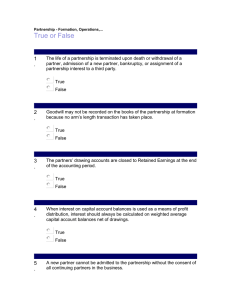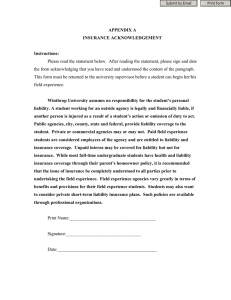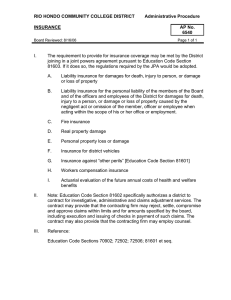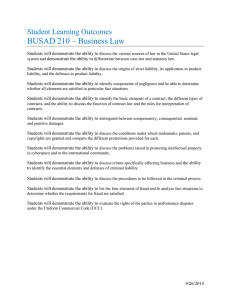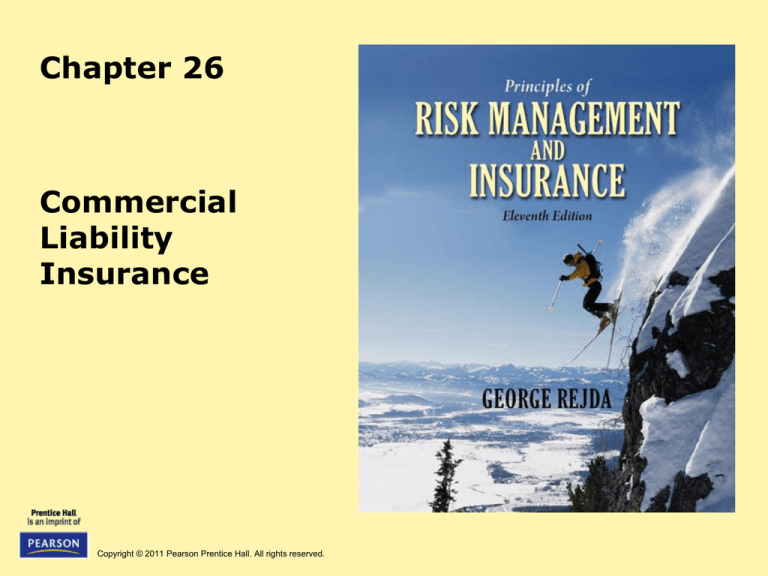
Chapter 26
Commercial
Liability
Insurance
Copyright © 2011 Pearson Prentice Hall. All rights reserved.
Agenda
•
•
•
•
•
•
•
•
•
•
General Liability Loss Exposures
Commercial General Liability Policy
Employment-related Practices Liability Insurance
Workers compensation insurance
Commercial Auto Insurance
Aircraft Insurance
Commercial Umbrella Policy
Businessowners policy
Professional Liability Insurance
Directors and Officers Liability Insurance
Copyright © 2011 Pearson Prentice Hall. All rights reserved.
26-2
General Liability Loss Exposures
• General liability refers to legal liability arising out of business
operations other than auto or aviation accidents and employee
injuries
– Some important exposures include:
• Premises and operations liability, arising out of the ownership and
maintenance of the premises where the firm does business
• Products liability, arising out of the manufacturing and sale of products
• Completed operations liability, arising out of faulty work performed
away from the premises after the work or operation is completed
• Contractual liability, arising out of the assumption of legal liability
through a written or oral contract
• Contingent liability, arising out of work done by independent
contractors
Copyright © 2011 Pearson Prentice Hall. All rights reserved.
26-3
Commercial General Liability Policy
• The commercial general liability policy (CGL) is
widely used by firms to cover their general
liability loss exposures
– The policy comes in two forms: an occurrence form and
a claims-made form
• An occurrence policy covers liability claims arising out of
occurrences that take place during the policy period,
regardless of when the claim is made
• A claims-made policy covers only claims that are first
reported during the policy period or extended reporting
period, provided that the event occurred after the
retroactive date, if any, stated in the policy
– The CGL policy can be written alone or included in a
commercial package policy
Copyright © 2011 Pearson Prentice Hall. All rights reserved.
26-4
Commercial General Liability Policy
• Section I of the CGL contains three major parts of
coverage and supplementary payments
• Coverage A: Bodily Injury and Property Damage
Liability
– The insurer agrees to pay on behalf of the insured all sums
up to the policy limits that the insured is legally obligated to
pay because of bodily injury or property damage
• The bodily injury or property damage must be caused by an
occurrence, I.e., an accident, including continuous or repeated
exposure to substantially the same general harmful conditions
• Coverage does not apply when a loss is known or is apparent
before the policy’s inception date
• Coverage includes defense costs, and the insurer has the right
to investigate a claim or suit and settle it at its discretion
Copyright © 2011 Pearson Prentice Hall. All rights reserved.
26-5
Commercial General Liability Policy
– Coverage A contains a lengthy list of exclusions, including:
•
•
•
•
•
•
•
•
•
•
•
•
•
•
•
Expected or intended injuries or damages
Contractual liability, with some exceptions
Liquor liability
Workers compensation and employers liability
Pollution, with some exceptions
Aircraft, auto, and watercraft, with some exceptions
Mobile equipment
War
Damage to property owned, rented, or occupied by the
insured
Damage to the insured’s product or work
Damage to impaired property
Recall of products
Personal and advertising injury
Electronic data
Distribution of material in violation of statutes
Copyright © 2011 Pearson Prentice Hall. All rights reserved.
26-6
Commercial General Liability Policy
– Coverage A includes legal liability coverage
• Also known as fire legal liability coverage
• Covers liability for fire damage to premises rented to the
named insured or temporarily occupied by the named
insured with the permission of the owner
• A separate limit of coverage applies
• Other damage to property rented by the insured is NOT
covered
Copyright © 2011 Pearson Prentice Hall. All rights reserved.
26-7
Commercial General Liability Policy
• Coverage B: Personal and Advertising Liability
– The insurer agrees to pay those sums that the insured is
legally liable to pay as damages because of personal and
advertising injury
– The policy covers legal liability resulting from:
•
•
•
•
•
•
false arrest
malicious prosecution
wrongful eviction or entry
slander
violation of privacy
copyright infringement
Copyright © 2011 Pearson Prentice Hall. All rights reserved.
26-8
Commercial General Liability Policy
• Coverage C: Medical Payments
– The insurer will cover the medical expenses of persons who
are injured in an accident on the premises or on ways next
to the premises, or as a result of the insured’s operations
• Expenses must be incurred within one year of the accident
• Payments are made without regard to legal liability
• Supplementary Payments: Coverages A and B
– In addition to the policy limits, coverage includes:
•
•
•
•
All expenses incurred by the insurer
Up to $250 for the cost of a bail bond
Up to $250/day for actual loss of earnings by the insured
Prejudgment interest
Copyright © 2011 Pearson Prentice Hall. All rights reserved.
26-9
Commercial General Liability Policy
• Section II of the CGL indicates the individuals and
organizations that are considered “insureds”
– If designated in the declarations, insureds include:
•
•
•
•
•
Owner and spouse if a sole proprietorship
Partners, members, and their spouses if a partnership or joint venture
Members and managers if a limited liability company (LLC)
Officers, directors, and stockholders if a corporation
A trust and trustees, but only with respect to their duties as trustees
– Insureds also include persons not named in the policy:
•
•
•
•
•
Volunteer workers acting for the organization
Employees acting within the scope of employment
Any person or organization acting as a real estate manager
A legal representative if the named insured should die
Any newly acquired or formed organization, other than a partnership,
joint venture or LLC
Copyright © 2011 Pearson Prentice Hall. All rights reserved.
26-10
Commercial General Liability Policy
• Section III of the CGL contains the coverage limits
– The general aggregate limit is the maximum amount that the insurer will
pay for the sum of the following:
• Damages under Coverage A (except for amounts paid for products-completed
operations hazard), damages under Coverage B, and medical payments under
Coverage C
– The policy contains a separate products-completed operations hazard
aggregate limit
– A personal and advertising injury limit is the maximum paid under
Coverage B
– An each-occurrence limit is the maximum amount the insurer will pay for
the sum of damages under Coverage A and medical expenses under
Coverage C arising out of any one occurrence
– The damage to rented premises limit is the maximum amount paid for
damages under Coverage A due to a single fire
– The medical expense limit is the maximum amount paid under Coverage C
because of a bodily injury sustained by any one person
Copyright © 2011 Pearson Prentice Hall. All rights reserved.
26-11
Exhibit 26.1 Illustration of the CGL Limits of
Insurance
Copyright © 2011 Pearson Prentice Hall. All rights reserved.
26-12
Commercial General Liability Policy
• Section IV of the CGL states the various conditions that
apply to the coverage form
– For example, this section contains provisions for dealing with
bankruptcy, and the duties in the event of an occurrence
• Section V of the CGL contains the definitions of various
terms used in the policy
– Some terms defined in the policy include “advertisement”,
“hostile fire”, and “volunteer worker”
Copyright © 2011 Pearson Prentice Hall. All rights reserved.
26-13
Commercial General Liability Policy
• The ISO claims-made policy is similar to the occurrence policy
with the major exceptions of:
– Payment of claims is on a claims-made basis
• The policy covers only those claims that are first reported during the
policy period
– The event must occur after any stated retroactive date
– The policy contains an extended reporting period provision
• The purpose is to provide coverage under an expired claims-made
policy for claims first reported after the policy expires
• The basic extended reporting period, with two separate reporting
“tails” is automatically provided in certain circumstances (e.g.,
cancellation)
– The first tail is a five-year period after the policy expires
» Covers events that occur during the policy period, and are reported to
the insurer, but a claim may not yet be made
– The second tail is a 60-day period after the expiration date
» Covers events that occur during the policy period that the insured may
not be aware of
Copyright © 2011 Pearson Prentice Hall. All rights reserved.
26-14
Employment-related Practices Liability
Insurance
• Under the ISO employment-related practices liability
insurance coverage, the insurer agrees to pay damages
resulting from a “wrongful act” arising out of:
–
–
–
–
–
–
–
–
Demotion or failure to promote
Wrongful termination
Negligent hiring or supervision
Retaliatory action against employees
Coercing an employee to commit an unlawful act
Work related harassment
Employment-related libel
Other work-related verbal, physical, mental, or emotional
abuse, such as gender discrimination
Copyright © 2011 Pearson Prentice Hall. All rights reserved.
26-15
Employment-related Practices Liability
Insurance
• The ISO form provides for a legal defense
– Included as part of the policy limit
– A claim cannot be settled without the insured’s consent
• Exclusions include:
–
–
–
–
criminal acts
contractual liability
workers compensation
violation of laws applicable to employers, such as the Age
Discrimination in Employment Act
• Interest in this coverage is increasing due to an increase in
suits against employers for sexual harassment
Copyright © 2011 Pearson Prentice Hall. All rights reserved.
26-16
Workers Compensation Insurance
• Workers compensation insurance provides medical care,
cash benefits, survivor benefits, and rehabilitation services
to workers who are injured or die from job-related accidents
or disease
– Benefits are paid on the principle of liability without fault
– The workers compensation and employment liability policy
contains three parts:
• Part One: Workers compensation insurance
• Part Two: Employers liability insurance
• Part Three: Other-states insurance
Copyright © 2011 Pearson Prentice Hall. All rights reserved.
26-17
Workers Compensation Insurance
• Under Part One, the insurer agrees to pay all workers
compensation benefits and other benefits that the employer
must legally provide to covered employees who have a jobrelated injury or an occupational disease
– There are no policy limits. The insurer pays all benefits
required by state law
– The employer must reimburse the insurer for any payments
that exceed regular benefits in certain cases, e.g., willful
misconduct by the employer
Copyright © 2011 Pearson Prentice Hall. All rights reserved.
26-18
Workers Compensation Insurance
• Under Part Two, the insurer agrees to pay those
sums that the insured is legally liable to pay as
damages for worker injuries that are not
compensable under Part One
– This coverage is needed in some states where workers
compensation is not required for smaller employers
• Employees who are injured must sue for damages
– Also, an employee may sue for injury caused by an
accident at the job site, but the injury is not considered
work related
– The coverage contains many exclusions, including:
• Bodily injury to an employee employed in violation of the law with
the knowledge of the insured
• Intentional bodily injury by the employer
Copyright © 2011 Pearson Prentice Hall. All rights reserved.
26-19
Workers Compensation Insurance
• Part Three provides other-states insurance
– The employer is covered for workers compensation claims
arising in states not listed on the information page
(declarations page)
• Part One covers claims arising in any states listed on the
information page
• Part Three coverage applies only if one or more states are
listed on the information page
• Workers compensation insurance provides economic
security to workers who are disabled by a jobrelated accident or disease
– Weekly cash benefits are paid during the period of
disability; medical care is unlimited and rehabilitation and
survivor services are available
Copyright © 2011 Pearson Prentice Hall. All rights reserved.
26-20
Commercial Auto Insurance
• The ISO business auto coverage form is used to
insure commercial auto exposures
– There are ten numerical classifications or “symbols” for
covered autos
• Coverage of newly acquired autos depends on the symbols
selected
– The form includes liability and physical damage coverage
• It includes limited liability for pollution losses
• Options for physical damage coverage include
comprehensive, specified cause-of-loss, and collision
• Coverage for towing and labor costs can be added
Copyright © 2011 Pearson Prentice Hall. All rights reserved.
26-21
Commercial Auto Insurance
• The garage coverage form is a specialized form for auto dealers
– The insurer will pay all sums that an insured must legally pay as
damages because of bodily injury or property damage caused by
an accident in the course of garage operations
• Garage operations includes garage business locations, autos covered
under the form, and all operations necessary or incidental to a garage
business
• Damage to property of others in the insured’s care, custody, or control
are excluded
– Adding garagekeepers legal liability coverage can eliminate this exclusion
• There is no coverage for property damage to any of the insured’s
products if the product is defective at the time it is sold
• Physical damage insurance on covered autos can be included
Copyright © 2011 Pearson Prentice Hall. All rights reserved.
26-22
Aircraft Insurance
• Most states apply the common-law rules of negligence to
aviation accidents
– Some states have absolute or strict liability laws that hold the
owners or operators of aircraft absolutely liable for aviation
accidents
– Absolute liability is imposed on commercial airlines for aviation
accidents that occur during international flights
• Aviation insurance is highly specialized coverage and is
underwritten by a small number of insurer organizations
• Major airlines generally buy a minimum of $1.5 billion of
liability coverage on their jets
Copyright © 2011 Pearson Prentice Hall. All rights reserved.
26-23
Aircraft Insurance for Private Business
and Pleasure Aircraft
• Global Aerospace provides coverage for private business
and pleasure aircraft
– The policy provides coverage for property damage and bodily
injury arising out of the ownership or use of the insured
aircraft, medical expense coverage, and physical damage
coverage for damage to the aircraft
• Several liability coverages are available:
– Bodily injury liability excluding passengers
– Passenger bodily injury liability
– Property damage liability
• Some exclusions to liability coverage include:
– Property damage or bodily injury arising out of liability
assumed in a contract
– War, hi-jacking
Copyright © 2011 Pearson Prentice Hall. All rights reserved.
26-24
Aircraft Insurance for Private
Business and Pleasure Aircraft
• The medical expense coverage pays reasonable
medical expenses for passenger injuries
– Crew members are generally excluded
• Physical damage insurance provides coverage for
direct damage to the aircraft.
• Three forms are available:
– “All-risks” basis
– “All-risks” basis, not in flight
– “All-risks” basis, not in motion
Copyright © 2011 Pearson Prentice Hall. All rights reserved.
26-25
Commercial Umbrella Policy
• A commercial umbrella policy can protect a business against
catastrophic liability judgments
• The ISO commercial umbrella policy pays the ultimate net
loss in excess of the retained limit for bodily injury, property
damage, and personal and advertising injury to which the
insurance applies
– The ultimate net loss is the total sum the insured is legally
obligated to pay as damages
– The retained limit refers to (1) the available limits of underlying
insurance listed in the declarations, or (2) the self-insurance
retention, whichever applies
• If a loss is covered by an underlying insurance contract, the umbrella
policy pays only after the underlying limits are exhausted
• If the loss is not covered by any underlying coverage, the insured
must satisfy a self-insured retention (SIR)
Copyright © 2011 Pearson Prentice Hall. All rights reserved.
26-26
Commercial Umbrella Policy
– Insureds are required to carry certain minimum amounts of
liability coverage before the umbrella insurer will pay any
claims
– The form contains a lengthy list of exclusions for bodily injury
and property damage liability, including:
•
•
•
•
Expected or intentional injury
Liquor liability
Pollution
Liability arising out of professional services
– The form also contains a list of exclusions for personal injury
and advertising liability, including:
• Criminal acts
• Failure of the product to perform as advertised
• Employment-related practices, such as harassment
Copyright © 2011 Pearson Prentice Hall. All rights reserved.
26-27
Businessowners Policy
• The ISO businessowners policy (BOP) includes liability
coverage that is similar to the CGL form
– The coverage includes:
• Business liability
• Medical expenses
• Legal defense
– Although the BOP excludes professional liability, some
professional liability endorsements are available for:
•
•
•
•
•
•
retail drugstores
barbers and beauticians
funeral directors
optical and hearing aid establishments
printers
veterinarians
Copyright © 2011 Pearson Prentice Hall. All rights reserved.
26-28
Professional Liability Insurance
• Professional liability insurance is available for certain business
professionals to provide protection against a lawsuit involving a
substantial error or omission
• The physicians, surgeons, and dentists liability coverage form
covers these professionals for acts of malpractice or omission
resulting in harm or injury to patients
– Liability is not restricted to accidental acts of the physician or
surgeon. The policy also covers the physician for liability arising
out of negligent acts of an employee
– Current forms permit the insurer to settle a claim without the
physician’s or surgeon’s consent
– An extended reporting period endorsement can be added to cover
future claims arising out of incidents that occurred during the
policy period
Copyright © 2011 Pearson Prentice Hall. All rights reserved.
26-29
Professional Liability Insurance
• Errors and omissions insurance provides protection against loss
incurred by a client because of negligent acts, errors, or omissions by
the insured
– This coverage is purchased by professionals who provide advice to clients,
such as:
•
•
•
•
•
•
•
insurance agents and brokers
travel agents
real estate agents
stockbrokers
attorneys
consultants
engineers, and architects
– The policies are generally issued on a claims-made basis, covering only
claims made in the current policy period
– Claims that result from dishonest, fraudulent, criminal or malicious acts by
the insured are specifically excluded
Copyright © 2011 Pearson Prentice Hall. All rights reserved.
26-30
Directors and Officers Insurance
• A directors and officers (D&O) liability policy provides financial
protection for the directors and officers and the corporation if
the directors and officers are sued for mismanagement of the
company’s affairs
– Typically, the policy agrees to pay damages on behalf of directors,
officers, and employees because of a wrongful act
– D&O policies are written on a claims-made basis
– Common exclusions include bodily injury and property damage,
libel and slander, personal profit, deliberate dishonesty by the
insured, and illegal discrimination
Copyright © 2011 Pearson Prentice Hall. All rights reserved.
26-31


